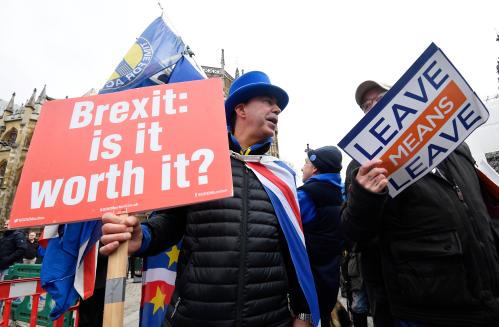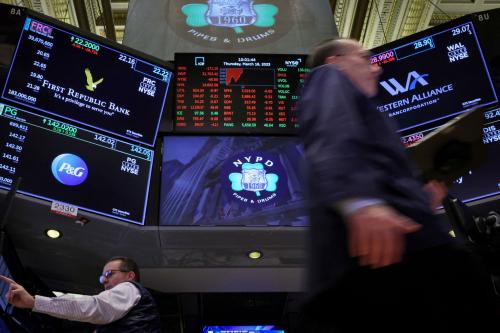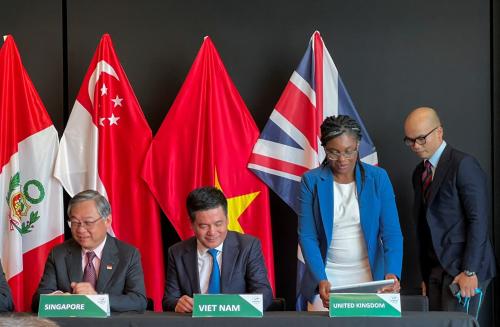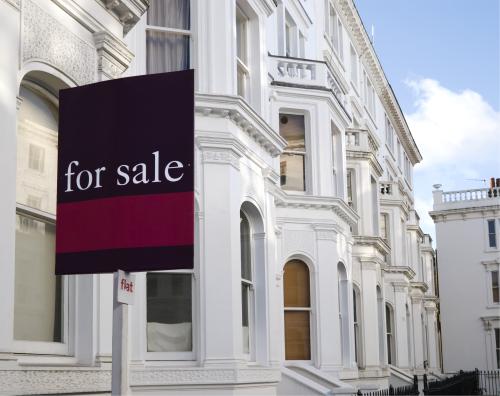The unique challenges posed by the Irish border vexed more than 18 months of Brexit negotiations, writes Amanda Sloat, and could still scupper a deal. As the end game nears, the peace process is not a price worth paying. This piece originally appeared in the Washington Post.
If anyone needs tidings of comfort and joy this holiday season, it is the long-suffering people of Northern Ireland. The unique challenges posed by the Irish border vexed more than 18 months of Brexit negotiations and could still scupper a deal. As the end game nears, the peace process is not a price worth paying.
When Ireland gained independence from the United Kingdom in 1921, the six northern counties comprising Northern Ireland remained part of the union. Its status has remained contested—with more than 3,600 killed during decades of violence known as the Troubles—between the Protestant and predominantly unionist community, and the Catholic and largely nationalist one. The 1998 Good Friday Agreement shelved the constitutional question and quieted identity politics. A power-sharing assembly gave both communities a voice in decision-making, while the British government reduced its military presence and paramilitary groups decommissioned their weapons. The European Union membership of the United Kingdom and Ireland has helped remove other physical, economic and psychological barriers.
Northern Ireland was rarely mentioned during the 2016 Brexit referendum campaign. Now it has become the key obstacle to finalizing the divorce. The U.K. is currently part of the E.U.’s customs union and single market. It will leave both after Brexit, which will raise the status of the Irish border to a customs border with associated controls. In addition to practical challenges, this will be psychologically devastating to many who live there. London wants to avoid the imposition of a hard border, by either developing alternatives to physical infrastructure or negotiating a future economic agreement with Brussels. Unless and until it does, the E.U. has insisted on a “backstop:” The entire U.K. will remain in a customs union with the E.U., plus Northern Ireland will comply with single-market regulations on goods. In short, harmonized rules reduce the need for intrusive checks.
As the backstop does not include time limits or allow the U.K. to withdraw unilaterally, Brexiteers fear the country could remain bound by its provisions and unable to negotiate separate trade deals. Northern Ireland’s Democratic Unionist Party (DUP), whose 10 members of Parliament prop up Prime Minister Theresa May’s Conservative government, opposes a special status for the region. The E.U. has resisted British calls to revise the backstop, yet there is a risk that this issue could cause the U.K. to crash out with no deal — which would lead to a hard border.
For all the talk about Northern Ireland in the Brexit debate, the region’s voice has been noticeably absent. Almost 56 percent of voters there preferred to remain in the E.U. Soon after the poll, Northern Ireland’s first minister (from the DUP) and deputy first minister (from Sinn Féin, the largest nationalist party) sent a joint letter to May; despite holding opposing views on Brexit, they shared concerns about how it could negatively affect the region.
The power-sharing executive collapsed several months later over a local scandal, with the politicized Brexit debate among the factors that made it impossible to reconstitute the assembly. As a result, Northern Ireland has not had a government in nearly two years. The DUP has the most sway over the British government, but it does not speak for everyone; a recent poll found 65 percent of voters in Northern Ireland would prefer a Brexit that preserves closer ties with the E.U., while pro-Remain opposition parties and businesses have publicly supported the backstop.
The very debate over Brexit has increased polarization in this post-conflict society, where “peace walls” still separate communities, fewer than 7 percent of children attend integrated schools, and punishment beatings by paramilitary organizations increased 60 percent over the past four years. Among Northern Ireland’s pro-Brexit voters (who are mainly unionists), an October poll found a staggering 87 percent believed the collapse of the peace process was an acceptable price. On the other side, Sinn Féin has called on Dublin to hold a referendum on Irish reunification as part of its no-deal planning. A recent poll showed 30 percent of voters in Northern Ireland would support a united Ireland if Brexit occurred under May’s deal (with the backstop), with support rising to 48 percent if there was no deal (requiring a hard border).
May’s deal is undoubtedly imperfect. Yet efforts to design alternatives that give Brexiteers the economic independence they crave and protect the Irish border have failed. Although London and Brussels have yet to finalize the terms of their future relationship, there remains an inescapable reality: The greater the divergence between U.K. and E.U. regulations, the greater the risk to Northern Ireland.
The backstop is not, as some Brexiteers argue, a trick to keep the U.K. locked into E.U. trading rules. Rather, it is an insurance policy to preserve a hard-won peace. Brexit will be consequential across the U.K., but its costs will be the highest in Northern Ireland. The price should not be undermining the Good Friday Agreement.








Commentary
Sacrificing peace in Northern Ireland is not acceptable price for Brexit
December 23, 2018